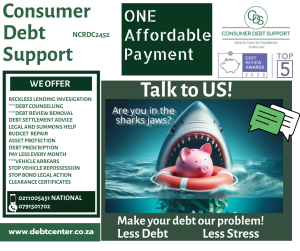Why Trust a Registered Debt Counsellor?
As we enter the final term of 2024, many families are reflecting on their financial situations, evaluating their goals for 2025. With the Christmas Festive Season fast approaching, consumers are beginning to assess their debt exposure and explore ways to make payments more manageable. Unfortunately, many are turning to social media platforms like Facebook, Instagram, TikTok, and LinkedIn to seek help. While these platforms provide convenient access to financial service providers, they are also breeding grounds for scammers, and consumers need to be cautious when trusting online advertisements.
Current statistics highlight just how dire the situation is: only 36.5% of income earners can afford basic groceries, leaving a staggering 63.5% of consumers struggling to provide enough food for their families. High inflation has severely impacted the ability to meet monthly credit obligations and living expenses. This financial strain has led more consumers to seek help, with approximately 11,000 consumers entering debt counselling programs every month. These consumers benefit from a five-year plan that lowers interest rates and reduces their monthly instalments, enabling them to afford basic living costs while meeting their debt obligations.
Many consumers, when faced with financial hardship, first approach their banks or credit providers seeking relief on their monthly instalments. While some banks offer short-term solutions, these often fall short, leaving unresolved financial problems. In these situations, banks may suggest visiting a registered debt counsellor before things spiral further.
Beware of Unregistered Debt Practitioners
Unfortunately, financial stress can push consumers into the hands of unregistered debt practitioners who offer services like debt mediation—a practice not regulated by the National Credit Regulator (NCR). These unregulated services frequently result in creditors rejecting payment plans, leaving consumers worse off. This often leads to Section 129 notices, prompting legal action from creditors and forcing consumers to turn to legitimate debt counsellors. In these cases, the importance of working with the right professionals cannot be overstated. Until the NCR finalizes guidelines for regulating debt mediation, consumers must remain cautious and informed.
Why Work with a Trusted Debt Counsellor?
A trusted debt counsellor plays a crucial role in ensuring your financial recovery is legitimate, transparent, and in your best interest. Registered debt counsellors are authorized by the NCR to assess your financial situation, negotiate with creditors, and restructure your repayment plans. This helps keep you on track toward financial freedom.
Why Choose a Registered Debt Counsellor?
- Legal and Professional Standing: Registered debt counsellors follow strict NCR guidelines, ensuring accountability and compliance with the law.
- Verified Credibility: By checking the NCR’s register of debt counsellors and the Debt Counselling Association of South Africa (DCASA), you can confirm that your counsellor is reputable and legally authorized to help you.
- Protection from Scammers: Unregistered practitioners are not bound by NCR regulations, putting consumers at risk of scams and financial loss.
- Proper Debt Restructuring: Only a registered debt counsellor can access the NCR debthelp portal where consumers data are stored and a Registered PDA to officially restructure your credit agreements and secure payment plans that creditors will accept.
- Budget Support and Assistance: A registered debt counsellor ensures your new payment plan leaves enough room for basic living expenses, providing you with the financial stability needed for you and your family.
How to Verify if a Debt Counsellor is Registered
Before entrusting your finances to a debt counsellor, ensure they meet the following criteria – follow the steps below:
- NCR Registration: Confirm that the debt counsellor is registered with the National Credit Regulator visit here: https://www.ncr.org.za/register_of_registrants/index.html
- Up-to-Date Registration: Ensure their registration is listed and current on the NCR Register of Registrants.
- Valid Debt Counselling Certificate: Check that their certificate is valid from 1 August 2024 to 31 July 2025.
- DCASA Membership: Ensure the counsellor is a member of the Debt Counselling Association of South Africa.
- PDA Certificate: Verify that the counsellor uses a Payment Distribution Agency (PDA) to manage your payments.
- Proof of Renewal: Ask for proof of certificate renewal, which is typically required by July each year.
- Visit HelloPeter: Check customer reviews on HelloPeter to see what others are saying. If you find concerning feedback, consider another company and do further research.
What Happens If a Debt Counsellor Fails to Renew Their NCR Certificate?
The NCR takes non-renewal very seriously. If a debt counsellor fails to renew their certificate, the NCR will revoke their access to PDA accounts and lock them out of the NCR debthelp portal. This means they can no longer manage payments or negotiate with creditors, leaving their clients at risk of legal consequences. Ensure your debt counsellor is always in good standing with the NCR by visiting the register of registrants on a annual basis.
Connect with Consumer Debt Support we have 15 years’ experience in debt counselling matters.
At Consumer Debt Support, we offer professional and trustworthy debt counselling services. Our website, debtcenter.co.za, is easy to navigate, and you can reach us by phone at 021 100 5451.
We offer:
- Lower interest rates on unsecured credit agreements and asset finance.
- Reduced monthly payments by restructuring interest and contractual obligations.
- A structured 5-year debt counselling program.
- Affordable credit life insurance options.
- Solutions for vehicle arrears and home loan restructuring with a 60-month concession period.
- Access to our FoodBank program for consumers needing additional support.
- Comprehensive financial guidance to help you regain control of your finances.
- Clearance status do you qualify within the NCR guidelines.

We are proud to be among the top 10 nominees in the 2024 Debt Review Awards, which recognize our dedication to excellent service. You can trust us to prioritize your financial well-being.
Common Issues Consumers Face
The NCR has identified several recurring issues affecting consumers:
- Debt Mediation Scams: Consumers with consent orders are often targeted by unregistered practitioners promising quick fixes, leading to legal action and further financial problems.
- Debt Review Removal and ITC Clearance Scams: Consumers eager to exit debt review often fall victim to companies offering to clear their ITC records for a high fee. These companies typically disappear after taking the money, leaving no recourse.
- Breached Payment Arrangements due to debt mediation poaching: When a consumer defaults on a payment restructuring agreement, creditors revert to the original contract, adding arrears and interest, worsening the situation.
- Confusion About the Process: Many consumers do not fully understand how debt counselling works. At Consumer Debt Support, we take the time to explain the process and the importance of consistent payments.
- Misunderstanding Debt Counselling: Debt counselling is often confused with debt collection, but in fact, it offers significant benefits like reduced payments, protection from creditors, and a clear path to financial recovery.
In Conclusion
There is no quick fix for debt problems, but by working with a trusted and registered debt counsellor, you can avoid many risks associated with unregulated services. Take the time to research and verify your debt counsellor’s credentials to ensure your financial recovery is in safe hands.
By doing so, you can stay on track and work toward achieving financial freedom.
.







